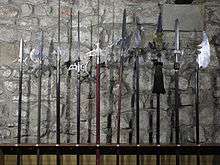halberd
Anglais
Étymologie
Nom commun
| Singulier | Pluriel |
|---|---|
| halberd \ˈhæl.bə(ɹ)d\ ou \ˈhɔl.bə(ɹ)d\ |
halberds \ˈhæl.bə(ɹ)dz\ ou \ˈhɔl.bə(ɹ)dz\ |

halberd
halberd \ˈhæl.bə(ɹ)d\ ou \ˈhɔl.bə(ɹ)d\ ou \ˈhɒl.bə(ɹ)d\
- Hallebarde.
- Enter the corpse of King Henry the Sixth, borne in an open coffin, Gentlemen bearing halberds to guard it; and Lady Anne as mourner. (The life and death of king Richard III - William Shakespeare)
- Entre le cadavre du roi Henri VI porté dans un cercueil découvert et entouré de troupes avec des hallebardes ; Lady Anne porte le deuil.
- Enter the corpse of King Henry the Sixth, borne in an open coffin, Gentlemen bearing halberds to guard it; and Lady Anne as mourner. (The life and death of king Richard III - William Shakespeare)
Variantes
- halbert
Apparentés étymologiques
Prononciation
- \ˈhæl.bə(ɹ)d\ ou \ˈhɔl.bə(ɹ)d\ ou \ˈhɒl.bə(ɹ)d\
- \ˈhɔ.bə(ɹ)d\ (Vieilli)
Voir aussi
- L’annexe Armes en anglais

Cet article est issu de
Wiktionary.
Le texte est sous licence Creative
Commons - Attribution - Sharealike.
Des conditions supplémentaires peuvent s'appliquer aux fichiers multimédias.